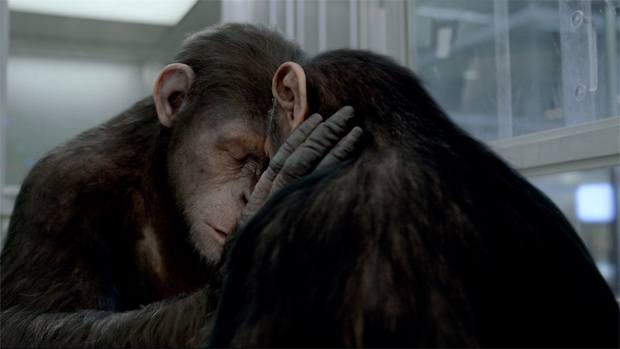
By Jennifer Mishler
‘Rise of the Planet of the Apes‘ has been getting a lot of praise from animal advocates for its use of computer-generated apes in place of live animals. Director Rupert Wyatt recently received a Proggy Award from PETA for “recognizing that real great apes don’t belong
on production sets.” Wyatt told the NY Times, “Live apes were considered and quickly abandoned — this is a story about animals being exploited and, um, it would have been morally wrong to exploit animals to make the movie.”
Last week, Ecorazzi’s own Michael d’Estries interviewed Gorilla Fund President and CEO Clare Richardson on the Mother Nature Network, and discussed the organization’s involvement with the film. Gorilla Fund became involved when Andy Serkis, a member of their Board of Directors, was asked to represent Caesar, the main character of the film. Richardson has applauded the decision to leave real great apes off the set. “It clearly sends the message to movie makers that you do not need to use live animals to make really good movies. And you especially do not need to use exotic and endangered wild animals to make movies. That was a very good opportunity for us, because when they see the animals in this movie, it will be very hard for the general public to realize that no live animals were used, absolutely none.”
Ms. Richardson did have some reservations at first about the way that great apes would be depicted. “One of the hesitancies I had with the film, of course, is that it’s quite violent. One of the things that we’re very anxious to dispel is this notion of gorillas and great apes are inherently violent — where as you and I both know that the most violent primate on this earth is man.” However, she seems hopeful that ‘Rise’s’ depiction of the way humans often treat great apes will be eye-opening for viewers. “I think the larger message of that particular sanctuary [in the film] is that they weren’t allowed to live in groups. They were isolated as individuals — something that doesn’t work for man, never mind great apes. So hopefully, people will look at that and start becoming more involved and asking good questions.”
When asked what viewers can do if they do find themselves with questions after seeing the movie, Ms. Richardson replied, “We would love them to go to our website, GorillaFund.org, and there are several other primate websites. Become involved in what is happening because it is all about habitat — the great apes and the rainforest in which they live are global assets, so if we lose them, then our planet is diminished. And if you’re concerned in any way about future generations — your children, your grandchildren — you should be looking at what we are doing to our planet.”
Head to the theater and let us know what you think about the ape-free movie! It hit theaters on August 5th.
Article courtesy of ecorazzi.com

